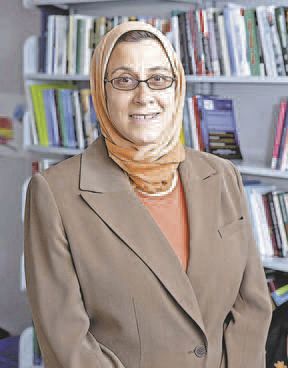By Lea Kahn, Staff Writer
Donald Trump may be one of the best things to happen to the American Muslim community.
That’s because his comments have forced Americans to focus on Islam and to hold a conversation that they have been avoiding since the Sept. 11 terror attacks.
Those were among several points that Princeton University professor Amaney Jamal made before dozens of people Thursday morning at the 55-PLUS meeting at The Jewish Center of Princeton.
There has been an on-going debate, sparked by Mr. Trump’s “outrageous” comments, about the extent to which Muslims have become part of the fabric of America and the extent to which they represent a threat to the country, Ms. Jamal said. She is the director of the Bobst Center for Peace and Justice at Princeton University.
But an examination of Muslim-Americans’ socio-economic status reveals that they are better educated and earn more than the median, she said. And while half of Americans do not hold Muslim-Americans in high regard, those who are under 30 years old have a more favorable view of them, she said.
Muslims are trying to fit into American society, Ms. Jamal said. Surveys show that 86 percent of Muslim Americans believe it is important to participate in politics, although only 25 percent are actively involved. Of second-generation Muslim Americans, 63 percent take part in sports and youth programs.
They are also patriotic, she said. Democratic presidential nominee Hillary Clinton invited a Muslim family on stage at the nominating convention whose son — a U.S. Army officer — was killed in battle. When the Central Intelligence Agency sought to recruit Muslims for 200 openings, it was flooded with 3,000 applicants.
“Yes, they are well paid, but they are patriotic,” Ms. Jamal said.
The federal Department of Homeland Security has refused to release the number of Muslim Americans who work for the agency, which leads one to believe that the numbers are large, she said.
Nevertheless, since the 9/11 terror attacks, hate crimes against Muslims have increased, Ms. Jamal said. Muslim Americans are worried about job security, backlash and stereotyping. She pointed to the three Muslim students who were killed in North Carolina by a neighbor.
Mr. Trump’s calls for profiling of Muslims and banning them from entering the United States has not helped. It is frowned upon to make negative comments about other groups, but “when it comes to Muslim Americans, it is acceptable. No one sanctions you,” she said.
There is no denying that Americans are concerned about terrorism and radical Islam, especially in the wake of the weekend bombings in New York City and New Jersey allegedly carried out by Ahmad Khan Rahami, who became self-radicalized. But of 6,688 cases of terrorism that occurred in the United States in 2014, only about three dozen involved Muslim Americans, she said.
Ms. Jamal pointed out that when an act of violence occurs, the news media do not mention the perpetrator’s religion. They do not say that a Christian walked into a church in South Carolina and opened fire. Religion is only mentioned when the perpetrator is a Muslim.
Ms. Jamal pointed out that of the 3 million to 8 million Muslims in this country, about 150 became self-radicalized and went to Iraq and Syria to fight. Young European Muslim men are more likely to become self-radicalized and travel to the Middle East to fight.
ISIS’ recruitment efforts focus on young men who are disaffected — they do not have a job or money. They feel that they are facing discrimination and hampered in their efforts to find work. ISIS is appealing to them because they are offered housing, money and a wife. Many of the recruits have petty criminal records and most of them are not religious, so they do not join for theological reasons.
Asked why the imams and mosques do not condemn radicalized Muslims who commit acts of terror, Ms. Jamal replied that they do condemn them. It just does not reach the wider community outside of the mosque. They are unable to gain any attention in the news media.
Wrapping up during the question and answer session that followed her remarks, Ms. Jamal said that “our job as a community and as a society is to get to know each other. That matters a lot. We don’t realize there is a whole world out there. We need to get to know each other.”

